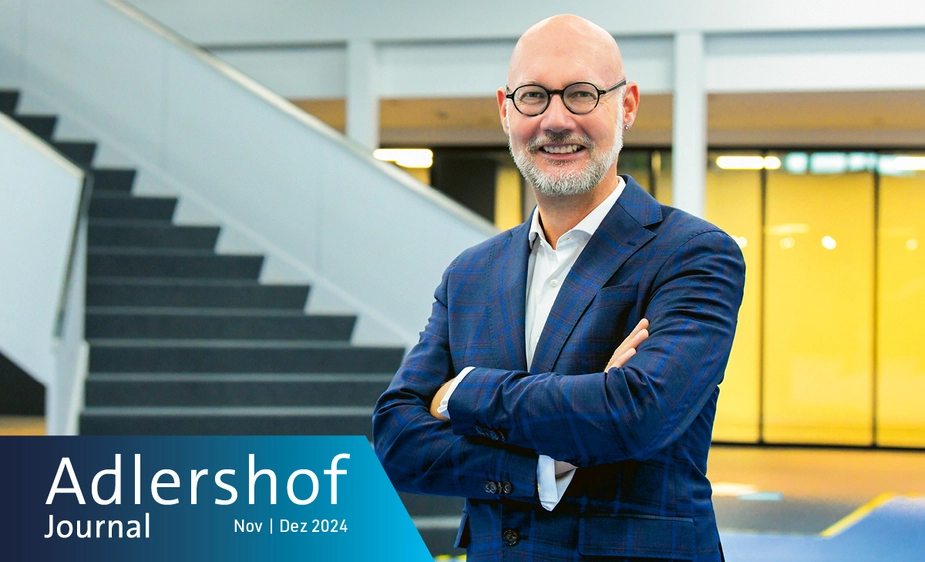Interim tenant with potential
The German Film and Television Academy Berlin is moving to Adlershof
Early next year, the German Film and Television Academy Berlin GmbH (DFFB) will vacate its premises at Potsdamer Platz, Berlin’s hub for culture and media, as its lease there expires. The DFFB has found temporary accommodation in Adlershof until it can move to its new quarters in Moabit.
Moving to Studio 16 is a particular challenge for the director of DFFB, Wolf Plesmann. A trained lawyer, he previously worked closely with the DFFB in issues of federal, European, and media policy while serving in the Berlin Senate Chancellery. Plesmann sees the academy’s departure from its 2,500-square-metre space at Potsdamer Platz as an opportunity: “We've been bursting at the seams for quite some time. The final move to Moabit will provide us with the much-needed extra space.”
The relocation is happening in stages. Mobile film equipment, including cameras, sound, and lighting gear, along with office furniture, has been moved in September. In December, only post-production will be left at Potsdamer Platz. Set for January, the second phase of the move will involve transferring post-production equipment and analogue cinema technology to Adlershof, as space allows. Much will remain packed—from files to technical equipment—until it reaches Moabit.
Due to limited space, most of the nearly 60 staff members will not have a permanent workspace. With two large television studios on-site, the Adlershof space is more spacious overall. However, it has significantly fewer seminar rooms and offices.
The beating heart of the 4,300-square-metre facility is a television studio of about 720 square metres, complete with an illuminated staircase, which the DFFB will use as an auditorium. “My wish is to strengthen our community at Adlershof. My vision is to bring students, staff, and lecturers closer together in this new location.” To this end, the “Akademiemontag” has been introduced, featuring various events, including film history seminars, which are open to all members of the academy and students. Moreover, events for an open exchange on current political topics will take place under the banner of “Akademiedialog”.
Surrounding the auditorium are seminar rooms that can be darkened for film screenings. “We are also building three soundproofed rooms for editing, a mixing studio, and a DAW (Digital Audio Workstation) for voice recordings and sound design. Additionally, nine digital and analogue editing suites, post-production spaces, and rooms for film equipment will be available. Another big plus, he says, is a ground-floor equipment depot that offers ample room for lighting, sound, and camera gear.
In this transitional year, the academy will not take on new students. The curriculum will focus primarily on film theory seminars—though practical sessions will still take place, and students will continue making films.
“As an academy, we have some flexibility in designing our curriculum. However, a practical focus is important, particularly in the first year when all students produce their own film. We can finish films on a smaller scale in post-production. Ideally, however, we need a cinema for the final screenings,” says the DFFB director. He is in discussions with a local sound studio and the Casablanca cinema to become able to produce more films. Plesmann has heard rumours about Adlershof’s strong cinephile community and is delighted by the prospect.
“We see our new location as an opportunity to experiment and place more emphasis on television. I have already reached out to Studio Berlin and would like to connect with other local production and media companies.” Plesmann also reports being in contact with non-media firms, like the For Life Produktions- und Vertriebsgesellschaft für Heil- und Hilfsmittel mbH, who can help arrange additional seminar rooms. “The people in Adlershof are curious about what we do as an academy and what we will contribute to the liveliness of the place.”
The DFFB is expected to move into its quarters, “Berlin Decks,” at Friedrich-Krause-Ufer in Moabit in late 2025. Until then, Wolf Plesmann and approximately 250 students will immerse themselves in Adlershof’s vibrant media environment.
Susanne Gietl for Adlershof Journal
